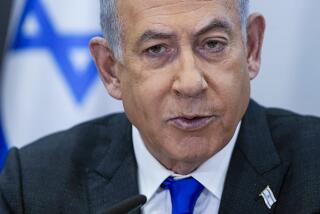Give Gorbachev a Forum, but Not Halls of Congress
- Share via
When Soviet leader Mikhail S. Gorbachev visits the United States in early December, he should receive ample opportunity to confer with congressional leaders and speak to the American people. But he should not address a joint session of Congress, any more than President Reagan should appear before the Soviet’s rubber-stamp parliament in Moscow.
The reason is clear: To address a joint session is a high honor that is--or ought to be--extended by Congress to statesmen who are friends of the United States and supporters of our democratic principles. The invitation bestows approval. It should not be conferred on authoritarian rulers, as it hs been to some supportive of U.S. foreign policy, such as former President Anastasio Somoza of Nicaragua and the Shah of Iran.
Gorbachev has yet to prove that he is a friend of the United States and an admirer of our values. As individuals, we may wish him well in his attempts to reform the Soviet Union. But it is still unclear what his legacy will really be. He has only recently come to power and his accomplishments still lag behind his rhetoric.
If President Reagan returns the Gorbachev visit with a trip to Moscow next year (the first for an American leader since Richard M. Nixon in 1974), he should also shun any suggestion that he address the Supreme Soviet. Although it is called the “highest organ of state power,” this bicameral body is hardly a legislature in any Western sense. It meets at most 10 days out of the year to ratify important decisions taken elsewhere in the Soviet bureaucracy.
It is in the national interest of both nations, however, that both Reagan and Gorbachev be given an opportunity to address each other’s populations. For the United States, such an appearance would be particularly important since Soviet citizens have limited means of learning about our President.
Reciprocity is the touchstone of U.S.-Soviet relations, so we should offer Gorbachev time on television and the Soviets should do the same for Reagan. But to liken a Reagan TV appearance in the Soviet Union, as some U.S. officials have, with a Gorbachev address to Congress would be a false equivalence and a mistake.
Gorbachev should visit Capitol Hill during his Dec. 7-10 stay and learn a little bit about legislative independence, a serious factor in Moscow-Washington relations. Gorbachev could usefully meet with leaders of the House and Senate and members of the two foreign affairs committees.
Technically, of course, it is the Senate that is called upon to advise and consent to the expected Soviet-American treaty on banning medium-range missiles. But parliamentary etiquette requires equal courtesies for equal houses. There is no doubt the treaty that Gorbachev and Reagan will sign will be criticized in the Senate. Two key questions are: Will opposition be limited to a handful of extreme right-wing senators, or will it be so close to 34 (the number needed to deny ratification) that opponents can add devastating reservations or killer amendments?
Gorbachev needs to convince the Senate that he will meticulously implement the agreement that he is about to sign with President Reagan. Otherwise, there is no hope for further progress in U.S.-Soviet arms control. No doubt Gorbachev will want to make the point that Moscow will be as punctilious as Washington about compliance.
Reagan might like to sign another treaty next year when he visits Moscow. But it is hardly likely that American and Soviet negotiators will be able by that time to cut through the difficult problems of reducing U.S. and Soviet long-range missiles by 50%.
Even if they did, it would be an illusion to believe that the Senate would ratify another pact until at least 67 out of 100 senators feel confident that Soviet compliance on the first one has been satisfactory.
Rational people will hope that Gorbachev’s visit will contribute toward making U.S.-Soviet relations more predictable and promoting mutual respect between our two peoples. In this vein, the White House might suggest that Gorbachev make a stop at the Lincoln Memorial, as did Chinese leader Deng Xiaoping in 1979. That would give the general secretary a chance to ponder those words that mean so much to Americans and our friends: “. . . that government of the people, by the people, for the people, shall not perish from the Earth.”
More to Read
Get the L.A. Times Politics newsletter
Deeply reported insights into legislation, politics and policy from Sacramento, Washington and beyond. In your inbox twice per week.
You may occasionally receive promotional content from the Los Angeles Times.










